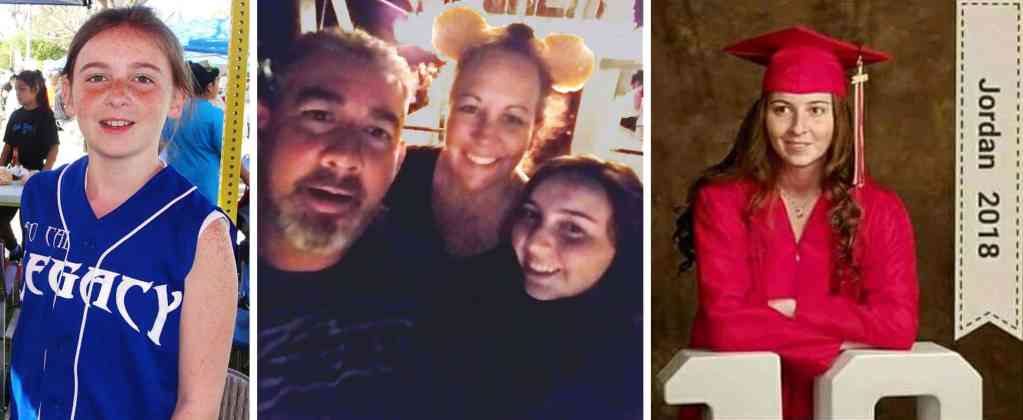Jordan Perez’s love for softball began at four years old. She played for Riverside Girls Softball Association where she was a two-time All Star. She also played travel ball and made the high school softball team. The softball life was a family affair with her dad, Anthony, as coach of one of her teams. Jordan’s dad gave her the nickname Jellybean. Devoted to the game, she played in the outfield and took pitching lessons.
The highlight of her softball career was when Jordan made her high school team as a freshman. She was looking forward to taking the pitching mound. Sadly, she never pitched or played in a single game. Jordan was never able to suit up because of her increasing pain.
In addition to her athleticism, Jordan was a star student who earned excellent grades, and had a gift for the arts. She could draw anything and was just learning to draw faces. Jordan’s dream was to go to Paris following high school to pursue her interests and gift in portrait and life drawing.
At 14 years old, Jordan began to suffer from severe headaches and was having trouble focusing. Her mom, Sandy, took her to the doctor. Jordan had blood clots in her brain. The doctors cycled through multiple diagnoses and Jordan endured eight surgeries in only six months. The only thing the surgeries improved was her vision. Jordan spent much of the next few years, her important teenage years, in and out of the hospital. Her doctors finally settled on a diagnosis of migraines. But none of the treatments seemed to work, and Jordan’s pain did not decrease. Her pain was so intense that she told her mom and dad that her hair hurt. As her condition continued to worsen, one doctor falsely accused the young teenager of abusing Motrin stating that she had to accept his diagnosis of migraines or he would not treat her. Knowing her condition was more serious, her parents continued to seek answers.
According to her medical records, an Infectious Disease Specialist indicated as early as January 2015 that Jordan may have blood cancer. Her medical providers had been told that her grandfather and great grandmother had histories with cancer. Yet, there is no evidence that any one of Jordan’s providers investigated the possibility that she had cancer. Jordan’s parents were certainly never told. If they had known, the entire course of Jordan’s treatment would have been different, and she would most likely be with them today.

Jordan’s cancer was never caught because her providers stuck by their initial misdiagnosis. In 2018, three years after she first started having symptoms, Jordan went to the emergency room with blood clots in her abdomen. Her parents were told her condition was not life threatening and she was sent home. The teenager was in agonizing pain. Still in pain, her parents took her back to the hospital where she was admitted. On the morning that Jordan died, her parents were told that she needed a liver transplant. This was a shock – they had been told just about two weeks before that Jordan’s labs were normal. Jordan was undergoing surgery to remove the shunt tubing from her abdomen in an effort to prevent infection from reaching the brain. She coded during the procedure and died. She was just 17 years old.
Jordan’s parents wanted answers but no one from the hospital would talk to them. Once they received her medical records, Jordan’s parents took the files to their primary care physician to review the bone marrow biopsy performed just before Jordan’s death. This led her parents to discover that she had Primary Myelofibrosis, a cancer that affects the blood-forming tissues in the body. Sandy then recalled that, about three and a half weeks before Jordan died a resident performing triage had mentioned Anti-Phospholipid Syndrome as a possible diagnosis. About two weeks before Jordan died, Sandy asked that Jordan be tested for blood cancer, but she was told it was unnecessary because Jordan’s labs were normal. Jordan’s medical providers had missed the cancer diagnosis that could have saved her life.
While trying to discover what had gone so wrong, her parents learned that Jordan was treated by a medical student at the time of the abdominal clots diagnosis which was deemed not life-threatening. Although a doctor signed a form stating that she was overseeing the medical student, Sandy and Anthony never saw that doctor.
Jordan’s blood was not regularly tested, and when it was tested those tests were not analyzed and reviewed. They also discovered that prior to Jordan’s death, the staff failed to perform neurological checks that might have saved her life. The facility is under state and federal investigation for these testing, monitoring and patient safety failures.
After Jordan’s death, her parents filed formal complaints with the Medical Board to hold her providers accountable. But the Board never reached out to interview them as part of an investigation. There was no medical consultant review. All but one of their complaints have been closed without any resolution or discussion. They were advised that the remaining open complaint would likely not receive an investigation because they were simultaneously pursuing civil litigation, also in attempt to get justice for their daughter.
“This is a systemic problem,” her mother says, “and the people harmed by medical negligence deserve justice and health care consumers deserve better. We need improvement and transparency in the complaint and enforcement process.”
Jordan wanted to be a forensic artist. She would have helped others obtain justice through her artistic talents. Jordan’s parents want to make sure there is accountability and justice for other rising stars.



